| RACING HISTORY |
YEAR: 1978
PEOPLE
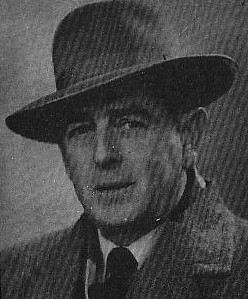 |
Mr Andy Wilson, a well known figure to most NZ trotting followers, first as secretary of the Wyndham Trotting Club for many years, and then through his association with such outstanding racehorses as Tactics, Cannelle, Adroit, Noodlum and Olga Korbut, died in Christchurch, last week at the age of 75.
As secretary of the Wyndham Trotting Club from 1934 to 1965, Mr Wilson was responsible for several major innovations in trotting. Most noteworthy perhaps was the withdrawal system, used to this day, which Mr Wilson's Club sponsored at the 1938 Annual Conference in Hamilton. Mr Wilson served as the Wyndham TC's delegate to Conference on several occasions, and another notable remit he passed for his club was one calling for more extensive control by Stipeniary Stewards. This was passed at the 1946 Conference in Wellington.
Another remit initiated by his club was to introduce qualifying trials, but in spite of support from the Southland Trotting Owners, Trainers and Breeders Association, this remit failed at the time. When sponsored by th NZ Trotting Conference, a couple of years later, this remit was passed.
During his years as secretary of the Wyndham TC, Mr Wilson and the club gave considerable thought to using the mobile starting barrier, and he corresponded with the Smith-Stanley Gate Syndicate in America as far back as 1943. The Wyndham TC was to be the first to use the mobile barrier in Southland, on February 30, 1968. The Wyndham Club was also the first outside Canterbury to stage a regular 2-year-old event, the NZ Kindergarten Stakes. That race is still one of the major juvenile events on the trotting calendar.
Mr Wilson's interest in breeding began in 1945 when he bought the 14-year-old Grattan Loyal mare, Nell Grattan. Her second foal for Mr Wilson was Tactics, a highly performed Light Brigade mare. From her, he bred Adroit, Guile, Astute and Deft, who was to later leave one of NZ's all time great pacers in Noodlum, and the outstanding filly Olga Korbut. Mr Wilson, who bred standardbreds in partnership with his wife, Ann, was one of the most respected men in trotting, and his efforts on behalf of the sport were many.
He was also the secretary of the Wyndham Racing Club, and in his capacity as a company secretary and accountant, served in many other fields. He served a period as town clerk in Wyndham, where he was born, was secretary of four rabbit boards and four dairy factories and was deputy chairman of the Wyndham Town Council. Mr Wilson saw home service with the Air Force during the Second World War and was a member of the Masonic Lodge.
An active sportsman, he played rugby, bowls, cricket and golf and was president of the Burnside Bowling Club in Christchurch in 1969. He was a foundation member of the Southland Owners, Trainers and Breeders' Association and served as president on that body. He also served on the Executive of the Canterbury OTB Association following his move to Christchurch in 1965 following his retirement.
Credit: NZ Totting Calendar 19Sep78
YEAR: 1978
PEOPLE
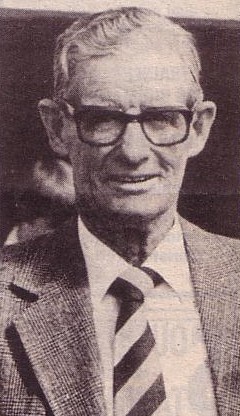 |
There were more eyes on Adjo at the start of the Lance Heron Trotting Handicap on July 22 than normal for the ninth favourite in a trotter's race at Addington. For Adjo's engagement marked the end of the 32 year long race driving career of Ted Lowe, of Hinds, near Ashburton.
Ted turned 65 on June 21 and can not renew his horseman's licence due to the compulsory retirement rule. Adjo did not oblige and allow Ted to go out in a blaze of glory as some other retiring drivers have done, but it was obvious in the driver's room, and at a presentation in the president's room that Ted Lowe commanded much respect regardless of the result of his final drive.
Adjo actually displayed no sense of occasion, breaking badly after 150m and finishing 12th. "He has broken a bone in his leg and I think the track was a bit hard for him. I was restraining him when he broke but it might have been better if I had pushed him into it," Ted said as he changed out of his colours for the last time. His four other drives earlier in the day had produced a somewhat unlucky third (promoted to second) with Single Lord, fourths with Ganelon and Wing Commander, and tenth with Lord George. "If Wing Commander hadn't turned his head to the side just as they let the tape go, I don't think he would have been beaten," Ted said. As it was, Wing Commander battled hard for fourth after making a big run to sit outside the leader with a round to go.
Ted was sad, but philosophical about having to give up driving. "It's an inconvenience. I'll miss out on a lot of fun, but it's the law and there's no use growling about it. Others have had to do it and it's a pleasure to end at Addington on a fine day. But I will miss all my friends out on the track - they're terrific fellows, and there is a tremendous amount of unwritten law and self respect among them," he said.
Ted's major driving victories came in the 1968 NZ Cup and the 1968 New Brighton Cup (both with Humphrey) while he trained Wag to win the 1972 National Flying Pace and the 1973 Stars Travel Miracle Mile. He also owned Cairnbrae trained and driven by Ces Donald to win the 1964 NZ Cup.
Born into a trotting family on June 21, 1913, Walter Edward Lowe did not begin driving until after the Second World War, when he served in the 20th Battalion "with Charlie Upham and several other good trotting men." Ted was among those taken prisoner at El Alamein, on July 15, 1942, and spent most of his prison life in hospital. He was hospitalised for 23 months with pleurisy and pneumonia, which left him with a "bad chest".
In his first race drive, at a Kaikoura Trotting Club meeting at Rangiora on March 23, 1946, Ted finished fourth with Gloxania in the first division of the two-mile Parsons Handicap, won by Ben Adam. Owned by his father, Mr W T Lowe, trained at Hinds by Dave McGregor, Gloxania was the dam of Grouse, whose son Wheatson has taken a mark of 1:58.6 in the United States this year. Later in the 1945-46 season, Ted guided Gloxania to third twice in one day, in harness races on the Oamaru Jockey Club's programme on June 15, 1946. "The placings on Gloxania made me a B Grade driver," Ted recalls. Baadin, a Lucky Jack-Mistral 4-year-old he owned, provided Ted with his first winning drive - a deadheat with Supplement (Dillon Hall-Love Brigade) at the Waikouaiti Racing Club's meeting in January 1, 1948. "I was then an A Grade driver, but I didn't do much driving after that, until I took up training in the 1950's," he said.
Trotting records show Ted Lowe as retiring with 157 winning drives to his credit (not including any seasons when he had less than three wins) and 223 training successes. His best season was the 1962-63 term. He was leading owner with 28 wins and £16,940, eighth on the drivers' list with 21 wins and fourth highest trainer with 22 wins. Of the 28 races won by Lowe owned horses that season, Cairnbrae contributed eight, Grouse and Peel six each, and Urrall and Lyndhurst (Captain Adios-Gloxania) three each. Cairnbrae was trained by Lowe himself for his first three wins in 1962-3, then went to Ces Donald, who prepared him for another five victories, in succession.
"Humphrey was the best all round horse I drove - he could sprint and stay," Ted says of the horse which gave him his most notable driving success. "When I got hold of him the game was easy - good horses make good drivers. I was never any great shakes as a driver, but I could hold my own - with horses I knew."
Ted says the most noticeable change in racing over the years is the move towards shorter races nowdays. "Races are run in more of a rush. You used to be able to sit back and wait like you can still do to a certain extent on the bigger courses like Ashburton and Methven. I don't think the change has improved the horse," he said.
Ted now intends to put more driving opportunities to help the way of his stablehand Paul Young, while Doody Townley will continue to handle West Street "when it suits him."
-o0o-
Extract from NZ Trotting Calendar 26March85
Ted Lowe, who died in Ashburton last week, was one of NZ's best known amateur horsemen. From his farm near Hinds in the Maronan district of Mid-Canterbury, Ted Lowe produced a string of top class pacers over the years, and numbered two NZ Cups to his credit. His first Cup victory came in 1964 with Cairnbrae, trained and driven by the late Ces Donald, but in 1968 Ted had his own moment of glory as trainer-driver of Humphrey who took out the premier staying event.
Many Lowe horses were named after areas in the Mid-Canterbury district, and a drive along the back roads is like a roll call of many of his early winners - Lyndhurst, Lauriston, Mitcham, Barrhill etc.
Better known winners of recent times to race in the Lowe colours include the former NZ mile record holder Wag (1:57.2) who set his mark in winning the then Stars Travel Miracle Mile (now Pan Am Mile), Dundas, Atanui, Grouse, Corwar, Stortford Lodge, The Raider, Urrall, Pun, Wing Commander, West Street, Templar and Siouan to name a few.
Ted Lowe had been in ill health for a good number of years, largely caused by the long period he spent as a prisoner of war in Norway during the Second World War, being captured at El Alamein when serving with the 20th Battalion.
Few major races escaped Lowe representatives, though he was never to produce a Derby winner. If sentiment were to rectify this state of affairs, Samson would have taken out the 1985 Great Northern Derby at Alexandra Park just two days before Ted's death. Samson was favourite for the event, on the strength of his brilliant lead-up form, but unfortunately went off-stride soon after the start and took no part in the race.
Ted also took a very active role in trotting administration, serving the Trotting Owners' and Trainers' Association in Mid-Canterbury, and the Ashburton Trotting Club. He joined the Ashburton Trotting Club committee in 1958 after several years as a steward, was president from 1977 to 1980, then was re-elected to the committee again in 1983 after three years as immediate past president.
Until his retirement from race driving at the age of 65, Ted did much of his own driving, but encouraged young reinsmen in his employ. George Adamson drove many winners in the Lowe colours, and in recent seasons Paul Young has proved a highly successful stable reinsman.
Ted Lowe is survived by his wife Lillian and six step-children. He was 71 at the time of his death.
Credit: Rod Carr writing in NZ Trotting Calendar 1Aug78
YEAR: 1978
INTERDOMINIONS
MELBOURNE - MARKOVINA
Bred in New Zealand, owned in South Australia and trained in Victoria, 6yo entire Markovina became 1978 champion in the first all mobile series, the first staged at Moonee Valley and the first boasting a six figure Grand Final Purse. Markovina survived an inquiry into alleged interference, and his win represented a masterful training and driving feat on the part of Melbourne horseman Brian Gath.
YEAR: 1978
FEATURE RACE COMMENT
1978 BENSON & HEDGES NZ FREE-FOR-ALL
Trusty Scot added the Benson and Hedges NZ Free-For-All to his victory in the NZ Cup when he won a torrid and exciting contest.
The Free-For-All was a far better contest, with Palestine responsible for a cracking pace which saw Trusty Scot record 2:29.1 for the 2000 metres, a mile rate of 2:00.1. Once again, Trusty Scot secured a dream trail behind the pacemaker, and he dashed past Palestine to take a handy lead soon after turning for home.
He was under some pressure at the finish, but held out Belmer's Image and Lord Module by half a neck and half a neck. Belmer's Image made ground strongly, as did Lord Module, who was trapped three wide early, then had to move out sharply at the 300 metres to avoid the tiring In Or Out. Win favourite Sapling made ground strongly after losing a handy position on the outer in the middle stages.
Credit: NZ Trotting Calendar
YEAR: 1978
FEATURE RACE COMMENT
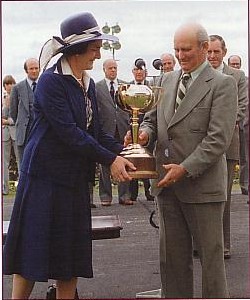 |
| Adam Hunter receives the Cup from Colleen McDermott, wife of the Met President |
Last season's top sire, the now defunct Scottish Command, left his second successive New Zealand Cup winner when Trusty Scot bested the favourite Sapling at the end of a relatively tame contest.
Trusty Scot, only regarded as an outside Cup chance when he resumed racing in the Ashburton Fying Stakes in October, firmed as one of the best prospects for last Tuesday's big event when he won at Ashburton, then followed it up with a win in the final lead-up Cup race, the Kaikoura Cup nine days before the Addington feature.
Some notable 'judges' had expressed doubts as to the patience and temperament of Trusty Scot's young driver, Henderson Hunter, who at 26, was the youngest driver in last Tuesday's field. But Henderson drove with all the skill and aplomb of a reinsman of many more years experience in landing home the Southland-bred entire a half length winner over Sapling. Trusty Scot made a brilliant beginning and led by three lengths after 100 metres, but Henderson then eased him to trail as Sapling sped round the field to lead at the end of 600 metres.
Henry Skinner looked set to land his first Cup winner as he dictated the terms entirely to his own satisfaction, but Trusty Scot pulled out from the trail at the turn, ranged up alongside 150 metres out and outstayed the pacemaker by half a length. Henderson, who races Trusty Scot in partnership with his father Adam, moved to Ohoka last winter to train at the property of his father-in-law, Bill Bagrie, and dedicated his time towards preparing the talented pacer for the Cup.
The finish of the Cup proved a triumph for New Zealand-bred stallions, as the runner-up, Sapling, is by the veteran sire Young Charles and the only other runner by a New Zealand sire, Lord Module, finished fifth. He is by Lordship.
As a spectacle, the race was relatively tame, only developing into a true staying test over the last 1600 metres, the first 1600 taking 2:10.2. The last 1600 took 2:02.6 with the last 800 metres in a startling 57.7 and the final 400 metres in 29.2. With such a fast pace being set only over the last 1600 metres, those trying to improve from the back were left with little chance, and virtually the first four on the home turn filled those placings at the finish.
Rocky Tryax, who settled three back on the rails and was tracked throughout by Wee Win, filled third a length and a half behind Sapling, with Wee Win battling into fourth half a neck back, one place further back than he finished in last year's Cup. Lord Module, attempting to become only the fourth four-year-old in the 75 year history of the event to win the Cup, was far from disgraced in finishing fifth. He stood on the mark after becoming restless in the No.1 barrier position and was six back on the rails when the field settled into position. He worked his way through the traffic on the turn without really getting a clear run and did well under the circumstances.
Belmer's Image made ground for sixth ahead of the North Islanders Bronze Trail and Rondel. Bronze Trail made ground after a slow start but Rondel enjoyed the run of the race and faded from the home turn. Little could be said of the remainder who were well and truly beaten.
Credit: Editor NZ Trotting Calendar
YEAR: 1978
FEATURE RACE COMMENT
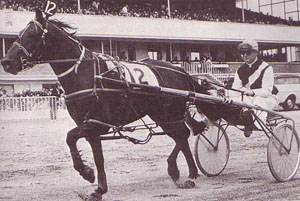 |
| Sovereign & Jack Smolenski |
Sovereign and Ostrava, two of the least experienced horses in the field, provided an exciting finish to the $25,000 NZ Derby Stakes after rival drivers adopted a costly sit and wait policy.
Sovereign, a beautifully bred colt by Bachelor Hanover out of the top class mare Royal Belmer, was having only his sixth start of the season and his seventh in all, while Ostrava, who also lacks nothing in breeding being by Nevele Romeo from Bravine, was having only his fifth season and career start.
Robin Butt took Ostrava straight to the lead with Sovereign dropping in to trail. It looked ominous for the others when Matai Dreamer made a safe beginning, while the hot favourite Genesis also became well placed early. But the writing was on the wall for these two when Ostrava was allowed to set a leisurely pace over the first 1600 metres. It was obvious that the race was going to develop into a sprint home and there was no way that those sitting further back in the field could outsprint Ostrava and Sovereign.
Sovereign looked as though he was going to be denied a run in the straight when Jack Smolenski went for a rails opening early in the run home, but once switched to the outside of Ostrava, he finished generously and wore him down by a neck. His time for the Derby was 3:29.6, the slowest time for the race since the distance was extended to a mile and five furlongs in 1970, then to 2600 metres in 1973.
Wing Commander, though beaten into third a length and a half back, turned in an exceptional run for third after getting well back early after a slow start. He was three quarters of a length clear of Matai Dreamer, who tried hard to make up ground over the final 800 metres but found the leaders travelling too well. Augustus Rex battled on well for fifth after racing in the open all the way and he was clear of Genesis who could made no impression over the last 400 metres.
Sovereign is raced in partnership by Messrs J M G & M Osborne and Jack Smolenski, and it gave Smolenski his first success in the Derby. Sovereign only started his racing career last June when he made an auspicious debut when third to Genesis and Prince Rapide in the Sapling Stakes at Ashburton. This season, he has gained three wins, a third and a fourth.
Credit: Tony Williams writing in NZ Trotting Calendar
YEAR: 1978
FEATURE RACE COMMENT
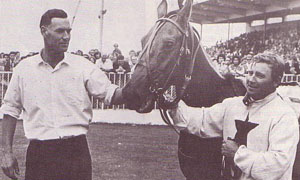 |
| 'Slim' Dykman, Scotch Tar & Robert Cameron |
Scotch Tar, a rank failure in the Worthy Queen Handicap, earned forgiveness for all his previous sins when he turned in one of the greatest exhibitions of trotting ever seen in a Dominion Handicap.
The five-year-old Tarport Coulter-Scotch Penny gelding claimed three records in beating warm favourite Spartan Prince - the New Zealand 3200 metre record, the Addington track record, and the Dominion Handicap race record. Scotch Tar won in the brilliant time of 4:11.6 - time which would have seen him score a clear cut over the pacers in the NZ Cup.
It was obvious right from the start that Brian Gliddon, driver of Alias Armbro, was not going to stand for any loitering on the journey. Alias Armbro cut out the first 800 metres in 1:04.8, then when Scotch Tar moved up outside him, the pace stepped up again and the half way mark was reached in 2:06.8. The 2000 metres was reached in 2:39.8, then the fireworks really began. Bob Cameron sent Scotch Tar forward to try and wrest the lead from Alias Armbro, and they cut out the next quarter to the 2400 metres in 29.7. Alias Armbro fought off the first challenge by Scotch Tar, but they still reached the 2800 metres in 3:39.5, with that quarter taking 30.4.
Scotch Tar edged past Alias Armbro soon after turning for home, but looked as though he would be under pressure to hold out Spartan Prince, who had enjoyed the run of the race all the way, and had not been involved in the classic battle between Alias Armbro and Scotch Tar. But not even a trotter of Spartan Prince's calibre could do anything but nibble at Scotch Tar's lead in the run home, and the brilliant five-year-old was holding Spartan Prince by three quarters of a length at the finish.
Backmarker Framalda, who was feeling the pinch at the 300 metres and broke briefly, recovered to battle into third but she was four and a half lengths back and two lengths clear of the weakening pacemaker Alias Armbro. Waitaki Gamble led in a well and truly beaten remainder three lengths back, with eight lengths to Isla Voss who started to feel the pressure when the leaders fired in the 29.7 to the 2400 metres.
Scotch Tar's time of 4:11.6 was a full 1.5 seconds inside Easton Light's great record of 4:13.1, set in winning the 1974 Dominion Handicap.
Scotch Tar, owned and trained by Slim Dykman at Chertsey, gave last season's leading sire, the now defunct Scottish Command, a notable double. Scottsh Command is the sire of the NZ Cup-NZ FFA double winner Trust Scot, and also the sire of Scotch Penny, dam of Scotch Tar.
Credit: Tony Williams writing in NZ Trotting Calendar
YEAR: 1978
FEATURE RACE COMMENT
1978 NZ OAKS
Lady's Rule will go down in the record books as being the winner of the 1978 NZ Oaks, but those records will not tell the true story of the courageous performance turned in by the third placegetter Gina Marie.
Without trying to take anything away from Lady's Rule, who gave of her best and gained due reward, she may have only been second to her North Island Oaks conqueror had not Gina Marie gone down on her nose at the start. A hot favourite to complete the Oaks double, Gina Marie moved off well enough, but after a couple of strides took fright when she heard a rival driver yelling. She stumbled, went down and looked certain to hit the deck. A stride past the post she was second, and it was a performance which stamped Gina Marie as a class above the other fillies this season.
Lady's Rule's victory, favoured though it was by Gina Marie's misfortune, was still deserved as she has proved an honest and consistent performer for trainer-driver Robert Dunn and owner Mr Bert Penney, a Kaiapoi freezing worker. Acting on instructions from Mr Penney, Dunn purchased Lady's Rule as a yearling at the National Sales for $1200. It was a wise investment, as a filly has now won $11,450.
Credit: Editor of the NZ Trotting Calendar
YEAR: 1977
BUILDINGS & FACILITIES
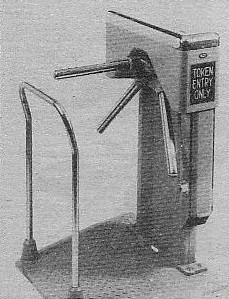 |
A new type of automatic turnstile, new to NZ at least, may soon be in operation on trotting and racing tracks in this country.
First developed in Australia by Automatic Totalisators Ltd, the automatic turnstile is now in widespread use throughout Australia, not only on racing and trotting tracks but at other major sporting venues. The automatic turnstile does away with the need for clubs to employ large numbers of gate staff to collect entrance money, and the model pictured was tested by the NZ Metropolitan TC at its two night National meeting this month.
Available either as permanent fixtures or as portable turnstiles, they offer great scope for racing and trotting clubs to save on costs. The turnstiles can operate either by patrons placing the entrance money directly into the coin block, or where admittance charges vary, by the use of tokens which can be purchased on the way in. The token system is the most commonly used on Australian trotting tracks where many New Zealanders are already familiar with the system.
At a time when all NZ trotting clubs are looking at ways of cutting costs, this new turnstile seems to offer wide scope for achieving this aim, particularly if clubs in the same areas were to get together to obtain the equipment in partnership.
First developed in 1959, the equipment has proved most successful and beneficial to clubs in Australia and it does not seem it will be long before NZ clubs adopt the same system.
Credit: NZ Trotting Calendar 30Aug77
YEAR: 1977
PEOPLE
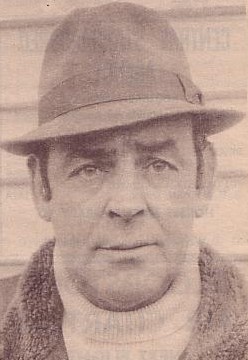 |
Part of the reason for Felix Newfield's consistent success in the trotting game is clear even before you reach his well laid out stables and yards. The gravel driveway is raked and neat, the facilities tidy and cared for. To quote the old saying there is a place for everything and everthing has it's place. While he doesn't actually say so it is obvious that he and his assistants place great emphasis on the finer points of running a racing stable. That attitude carried through to other areas probably explains why Felix has trained 315 winners in 25 years, making him one of the most enduringly successful horsemen of his generation. Newfield is a genial, sometimes controversial, personality but behind the quick quips there is another Felix Newfield; one who obviously puts a good deal of thought and planning into his establishment and the horses in his care.
Born in Lyttelton 49 years ago, Felix got involved with trotters when his family lived in Domain Terrace in Addington, close to the stables occupied by the late Jack Pringle. On leaving school Felix worked for Pringle for two years and when that trainer moved to Templeton the youngster joined Howie Smith in the same stable and stayed with him for eight years. His first driving experience was at the age of 16 in 1941, when he and Smith went to the Coast with Lord Brent and Blackdale. Newfield drove both without success and on his return the authorities took away his licence, there being a minor problem regarding age. Felix got his licence back when he reached 18 and his first success came shortly afterwards behind Grattan Bell at Greymouth. He won the next race, too with Sir Walter who was closely related to the Cup class pacer Cantata, the winning dividend being $288. At Westport he won three on end with Victory Boy.
Felix can tell stories about those early Coast trips which would appear almost bizarre to the modern stablehand. Jogging to the railway station in the afternoon to catch the train, clanking across to Greymouth or Reefton etc all night, jogging to the track for races, and then back to the train for another long ride home. The boys rode in the boxes with the horses with only a hurricane lamp to light up the card games or the stories of what had happened or what was going to. The trips to Dunedin, he recalls, were the worst. Sometimes the teams would be based on the Coast for weeks. Other times there would be just the day trips. Road transport in the war years was very difficult because of petrol restrictions which limited floats to being used in a 30 mile radius only. Newfield recalls on one occasion walking a team of horses with Addington trainer Joe Purdon (father of Alex) as far as Bankside where a float would be stategically placed to load the horses. You drove the thirty miles - further if you had the nerve - and then walked some more to the next float. Even meetings like Ashburton could be no cakewalk in those days.
In the early 50's Felix took up a private training position with Donald 'Sandy' Green at Methven. Success was almost immediate and in 22 months Felix trained 18 winners for Green, the mainstays being Gallant Satin, Fearless Peter, Quite Obvious (later a successful broodmare), Lothario and Robert Junior. In December 1952 at Waimate the young trainer won three races out of four for the owner with different horses. It was while at Methven that Felix got to know Colin McLaughlin and their association was to be mutually profitable for years to come.
A few months later Felix returned to Addington and set up on his own and on May 1, 1953, at the Reefton winter meeting came his first success on his own account. The horse was Marathon, owned by Mrs C Pateman, and he won an intermediate event by five lengths at odds of five to one. Not long afterwards Felix married Joan Harris fron Central Otago and moved to his present property at Templeton. It was a far cry from what it is now, having been used as a chicken farm. Felix built the stables and yards and milked cows as well to help him through the difficult early times of professional training.
His initial team was small. Main stake winners were Sedate, who was leased from Colin McLaughlin and who won four races before starting a breeding line which has proved highly successful including as it does Allakasam, Royal Ascot, Morsel and Flying Mile among its produce. Sedate was raced by Felix in partnership with Christchurch businessman Frank Kirkpatrick and Newfield's regard for his first stable patron is obvious. At the same time Frank raced Suzendy and she was a top mare winning 10 races and putting the stable well on the way to success. Frank Kirkpatrick still races horses from the stable and has remained a constant patron through the years - a trait of owners associated with Newfield.
By the end of the 1957 season Felix had reached sixth position on the trainers' table, Suzendy and Captain Free being the leading lights at that time. But it must have been hard work. With the assistance of Murray Hessey, now a trainer at Yaldhurst, Felix worked a big stable of horses and milked about 30 cows as well, which is a pretty daunting timetable even from this distance in time. His highest place on the table was third in 1962-3 when the stable produced 25 winners, only two behind the leading trainer that season, Ces Donald. Great Credit, that speedy but unruly horse was the leading stake winner. There have been any number of top horses through the stable. Johnny Guitar won a Wellington Cup and 10 other races. Queen Ngaio won 10 for the stable and ran fifth in the Cup, the closest Felix has been to achieving his great ambition of winning the big race. "There's not another race like the Cup is there?" he says, and one gets the feeling that nothing is going to be better fitted for the race than Nimble Yankee come November and all going well. Pancho Boy won nine including the Louisson Handicap and Queen Ngaio became dam of the outstanding but unsound pacer Waratah, raced by Joan Newfield and her father Jack Harris. Waratah won the Dunedin Cup and is now fashioning a creditable stud record against great odds in terms of attracting class mares.
There were other horses to recall from earlier days. Semloh was a Welcome Stakes winner, but unsound, and First Belle was a good winner for Felix which persuaded him to buy her first foal. Named John Craig, after the trainer's sons, he was sold to Australia where he was a champion three year old winning two Sires Produce Stakes and two Derbies, and he later did well in America. Earlier there had been Dilossa, Chiffon, Dacron, Seafield Hanover, Sirretta, Sirrah (Harris in reverse for the anagram pundits) and numerous others.
Felix had won his first Addington race in the late 40s with Elation, who splashed through the mud to score at long odds. Elation was later sold by his owner for two shillings and won two in a day for Colin Berkett at Addington, the first time paying a big dividend. Newfield has compiled a fine record in provincial Cup races, winning five at Greymouth for example and three Geraldine Cups, including American Chief's this season. He set some sort of record some years ago when lining five horses up in the New Brighton Cup, finishing first, second, fourth and fifth. He, of course, drove Royal Ascot in the dramatic Auckland Cup of 1973 and relates that he "didn't especially go looking for anyone" until it was announced the dividends were going to be paid out so that the Cup was safe following a controversial incident in the middle stages.
With Tronso he won a Dominion Handicap, and nearly brought off a unique finish to the Derby of 1973 when New Law beat Royal Ascot by a nose. Royal Ascot, driven by Alan Harrison, was called in first by the judge and Felix, with half shares in both horses, thought a dead-heat would have produced a most unusual Derby result.
This season has been another good one, the stable having 18 successes. Ambridge, now in the US won five and Warragamba, by Waratah from Laughlin's Lass who were both trained by Felix, won three, but the star has probably been Nimble Yankee who has risen from being a strong but unreliable pacer to a Cup prospect. American Chief has been another good winner.
Like all professional trainers, especially those who do well, Newfield no doubt has his critics. But a feature of his career has been the way his prominent owners have stuck with him through thick and thin. Frank Kirkpatrick and Colin McLaughlin have been mentioned. Another is Eugene McDermott who has been associated with the stable for more than 20 years through horses like Guinness, Black Label, Holmfield and now Americamn Chief and Gladarm. Few other trainers can match this sort of record over such a long period and it is one that Felix is rightly proud of. He doesn't expect to train so many winners in coming years as he has done in the past because things have changed in trotting. "Working them up and winning races and then selling them is the thing today and horses which might have won eight or nine in past years are now sold like Ambridge after four or five wins, or even earlier," he said.
He works about 20 to 25 now with help from Fraser Kirk, who has developed into an outstanding reinsman under Newfield, and his son Craig, who is 17 and with a good trials record behind him, is set for a probationary career next season. Bob Cole helps out in return for using Felix's track. Elder son John was more interested in machinery than horses but Felix's 15-year-old daughter Dianne is keeping the family name to the fore in pony circles. Most 15-year-old girls have their bedroom walls covered with pin-ups of pop stars. Dianne has so many show ribbons won on Bacardi Rum she doesn't have space for pop stars!
As Newfield shows you round the 36-acre complex you are soon aware that a lot of thought has gone into it's construction though there are some things he would now change. His basic training philosophy could be summed up as: "Keep them working, keep them warm and keep them well." He relates the horse's position to humans. How would you like to be shut up in one little room all day or get a cold shower in the middle of winter or run on concrete roads in steel boots? The answer is plenty of room for the horses during the day, warm water for hosing and plenty of attention to feeding and shoeing. Unlike a growing number of trainers Newfield still sets store by chaff which he uses constantly.
Newfield's training programmes have naturally been formed on what he observed as a young man. He names Ces Donald, F J Smith, Ces Devine and Jack Pringle as the best trainers he has seen. "I noticed that they always produced their horses on the big side," he says. "I try to do the same and this is partly why I race very few two year olds. They need time." He deplores the tendancy to drift away from 3200m races. "They made a lot of our horses because they didn't have to be worked up early. We could do with more of them."
Reinsmanship? Freeman and Maurice Holmes, Wes Butt, Jack Pringle and Bob Young are his tops and he also admires the driving of his good friend Jack Carmichael, who won a lot of races for the stable. "That was when Jack was younger of course," Felix adds with a grin. Newfield admits to being a collector of odds and ends. "We've three tractors on the property and never plough a paddock." He does however make a lot of his own hay, and fowls, ducks and peahens outnumber the horses on the property. His latest pride and joy are three peacocks brought from the North Island and there is the odd turkey as well.
Felix Newfield, as I said, has sometimes been a controversial figure but I found him candid answering the awkward questions. He will tell you what happened the day a Greymouth crowd gave him one of the noisiest receptions even that colourful area has witnessed. He says frankly that his own experience caused the public to miss seeing the best of Auditor, the finest horse he has ever trained. "He was phenomenal," Felix recalls, "and beat all the top horses of his day. But I was anxious to get him ready for the Cup and brought him back too soon after an attack of strangles. He was never the same again and had I known then what I know now he would have won a Cup." Auditor was owned by another long time patron in Jack Brosnan.
How does he react to the sometimes heard allegation that he is a tough cookie out on the track? "When Derek (Jones), Jack (Carmichael) and I started out years ago we were boys among men," he says, "and you had to quickly learn to look after yourself if you wanted to make it, because there were some great drivers about then. We did what we had to do and those days formed our driving patterns. These days it's easier and the old methods look worse than they are." He points out that young drivers have a much easier row to hoe today even though it is apparent that he feels the standards have slipped over the years. People in stands, he maintains, cannot properly read what is happening on a track particularly in a big race at Addington where you have to be in the race to experience what's going on. Newfield's ability in the cart was clearly evident in the Driving Championship held at Addington in March, which he won. Some of the horses he drove went a lot better that night than they had before and, in some cases, since.
He regards False Step as the finest horse he has seen and is adamant that today's horses would be hard put to match old time horses when it came to hardiness. "Jogging to the station, all night on a train, jogging to the track, having two races and jogging back to the train and so on was pretty testing," says Felix, "but they seemed to stand up to it." Returning to the topic of driving, he can recall the day he drove Swingalong in a race at Ashburton in which 40 horses started. Addington, by a mile, is the finest track he has driven on or seen.
Like I said at the start, Felix Newfield is a more complex character than he perhaps likes to appear. He has no doubt had his bouts of luck, good and bad, but there is also no doubt that he is a worker and the success he has had has not been lightly earned. Young men wanting to be top trainers should take careful note for it is consistently a hallmark of all top horsemen.
Credit: NZ Trotguide 6Jul77
| << PREVIOUS | 1 2 3 4 5 6 7 8 9 10 11 12 13 14 15 16 17 18 19 20 21 22 23 24 25 26 27 28 29 30 31 32 33 34 35 36 37 38 39 40 41 42 43 44 45 46 47 48 49 50 51 52 53 54 55 56 57 58 59 60 61 62 63 64 65 66 67 68 69 70 71 72 73 74 75 76 77 78 79 80 81 82 83 84 85 86 87 88 89 90 91 92 93 94 95 96 97 98 99 100 101 102 103 104 105 | NEXT >> |